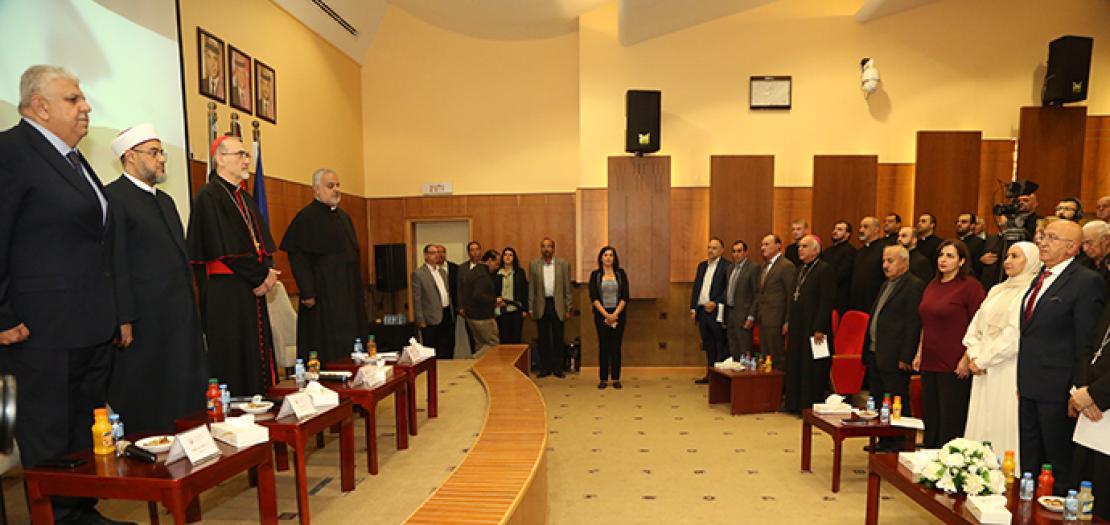Issued by the Catholic Center for Studies and Media - Jordan. Editor-in-chief Fr. Rif'at Bader - موقع أبونا abouna.org
"Document: Nostra Aetate," a 60-year-old document that paves the way for dialogue
The world witnessed a pivotal moment in the history of the Catholic Church at St. Peter's Basilica in the Vatican on October 28, 1965. Following four years of in-depth discussions during the Second Vatican Council sessions, that is undoubtedly considered the most important ecclesiastical encounter in the 20th Century, a vote was held on a crucial document, namely the document relevant to the relations with non-Christian religions titled, "Nostra Aetate".
This document is remarkable in the sense that it was not merely a theological text, but rather the fruit of long intellectual and spiritual efforts. It received an approval of 2,221 votes out of the 2,309 participants in the council voting. One week later, Pope Paul VI officially signed the document namely on December 8 1965, making it one of the most outstanding fruits of the council.
As we commemorate nowadays the 60th anniversary of this historic document, we recall the profound transformation it brought about in the Church's views towards the others, as it paves the way for dialogue between Christians and non-Christians around the world. In our Arab context, this document had a special impact, as it constituted the official starting point for Christian-Muslim dialogue, which constitutes up to this moment a bridge of mutual respect as well as humanitarian- and faith-based cooperation between the two religions.
The document was initially intended to be confined to the relationship between the Church and the Jews. However, if we look back a year, namely to 1964, we notice a significant event that expanded the scope of this document. In that year, Pope Paul VI's plane landed at Marka Airport, being the first papal plane to leave Italy's borders. Consequently, Jordan became the first country to receive His Holiness the Pontiff outside Italy. He was received by His Majesty King Hussein Ibn Talal, may his soul rest in peace, and during his three-day visit he met with several figures in Jordan and Palestine.
According to several observers, the visit to Jordan and Palestine motivated Pope Paul VI to expand the scope of the document within the Ecumenical Council, so that it would not be confined to the relationship with Judaism but to include followers of Islam and other religious traditions as well. Since that date, it may be said that Christian-Muslim dialogue has officially begun.
From this premise, the Catholic Center for Studies and Media has held an important symposium in cooperation with the American University of Madaba which was attended by His Beatitude Cardinal Pierbattista Pizzaballa, Patriarch of Jerusalem and member of the Vatican's Dicastery for Interreligious Dialogue; and Dr. Ahmad al-Khalayleh, imam of the Hashemite Court. The participants, along with a number of Christian and Muslim religious figures, recalled the importance of this historic document as well as the importance of the activities and the initiatives launched over the past six decades with regards to interfaith dialogue, particularly between Muslims and Christians.
We stress in this respect that there are unforgettable historic moments, the most prominent of which is the announcement of the overture of followers of religions to each other for launching dialogue. Dialogue is not merely intellectual but rather a dialogue of life enrooted in human nature, particularly in countries like Jordan and the Levant, where Christians and Muslims live side by side, jointly build their civilizations and societies, and work for attaining the comprehensive development of humanity in their dear homelands.
Jordan was among the leading countries to host seminars and sessions for intellectual religious dialogue, particularly in the 1980s, when meetings were launched by the Royal Aal al-Bayt Institute for Islamic Thought, and later by the Royal Institute for Interfaith Studies, with the intention to hold annual meetings with the Vatican with the aim of enhancing the shared values between Christianity and Islam. These initiatives were developed with the ascension of His Majesty King Abdullah II ibn Al Hussein to the Hashemite Throne, during which pioneering global initiatives were launched such as the Amman Message, A Common Word between Us and You, and the World Interfaith Harmony Week which are landmarks recalled by participants in the American University of Madaba symposium.
In conclusion, we mention to our dear readers of what was stated in that document 60 years ago, and what Pope Leo cited in his first meeting with non-Christian religious leaders, including a large number of Muslims, when he said: “I recall the document ‘Nostra Aetate,’ which opened the doors for dialogue and stated: “Relations between the Catholic Church and Muslims have been characterized by a growing commitment to dialogue and fraternity, driven by appreciation for our brothers and sisters “ who adore the one God, living and subsisting in Himself; merciful and all-powerful, the Creator of heaven and earth, who has spoken to men.” (Nostra Aetate, No 3)
The Islamic-Christian dialogue is nowadays in good shape, and it is poised for further activities and engagements, particularly with regards to cooperation between Muslims and Christians in the areas of justice and peace, migration, environment, and other issues of common concern, which require sincere cooperation as well as joint search for genuine and humane solutions that serve the extended human family.







